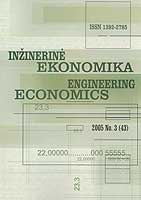Lithuanian “Brain Drain” Causes: Push and Pull Factors
Lithuanian “Brain Drain” Causes: Push and Pull Factors
Author(s): Aušra Kazlauskienė, Leonardas RinkevičiusSubject(s): Economy
Published by: Kauno Technologijos Universitetas
Keywords: brain drain; highly-skilled migration; push and pull factors.
Summary/Abstract: This article investigates Lithuanian “brain drain” causes: push and pull factors and its manifestation between different migrant groups. Traditionally international labour migration is interpreted as a response to the existing gaps in wage levels between countries. But the causes of migration should not be simplified to economic (usually wage/income) conditions. Even if economic factors dominate in most countries migratory processes, migration flows of each country are still influenced by the specific conditions or changes in local economy as well as country‘s historical perspective. Therefore migration determinants might be different in separate countries, especially when talking about highlyskilled migration. Perception of dominating factors in the Lithuania’s highly-skilled migration is needed to obtain an objective evaluation of the “brain drain” problem and to solve it in proper ways. Empirical research gives us a general picture of a Lithuanian highly-skilled migrant as being a young person with higher skills who treats his or her socioeconomic status at rather satisfactory level before departure and is more inspired by pull effects. Factor analysis reveals us four main factors of interrelated variables in Lithuania’s highly-skilled migration: professional attraction in foreign countries, socioeconomic conditions having mostly push effects, state academic system and collaboration manifesting itself both in push and pull effects, and state macroeconomic conditions and governmental policy showing mostly migrants’ discontent with the general situation of Lithuania. Other factors such as ecological conditions and family reunification play much lesser role in this phenomenon of brain drain. The article consist of two parts: first part deals with the concept of “brain drain” and its recent tendencies, in the second part Lithuanian brain drain causes: push and pull factors and their manifestation between different migrant groups are investigated.
Journal: Engineering Economics
- Issue Year: 2006
- Issue No: 1 (46)
- Page Range: 27-37
- Page Count: 11
- Language: English

